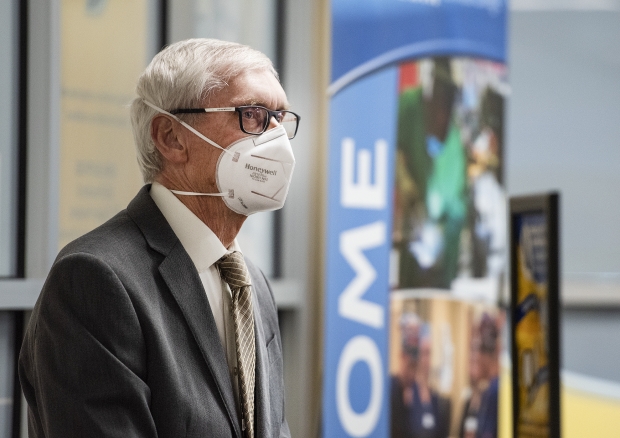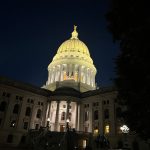Evers Strategizes on Pandemic
Seeking federal help to staff health care facilities, reserving some pandemic aid for future problems.

Gov. Tony Evers appears at a press conference Wednesday, Feb. 10, 2021, at Blackhawk Technical College in Janesville, Wis. Angela Major/WPR
As the omicron variant continues to drive COVID-19 case numbers higher in Wisconsin, Gov. Tony Evers is focusing on ways federal support can help the state cope with the latest virus surge.
Evers’ powers to respond directly to the pandemic through emergency declarations and statewide orders, including things like mask mandates and capacity limits at businesses, were sharply curbed by Wisconsin Supreme Court decisions earlier this year.
So, instead of mandates and state health orders, Evers said he will enter 2022 with a focus on how best to allocate billions of dollars in federal COVID-19 aid around the state, as well as getting support from the federal government for things like hospital and care facility worker shortages.
Wisconsin received $2.5 billion in coronavirus aid from the federal government in March. That’s on top of more than $3 billion from federal aid packages in 2020. The governor has the authority to decide how the vast majority of those funds are spent.
Recently, the federal money has gone to help support Wisconsin movie theaters, minor league sports teams and live event venues. The governor also announced a $60 million effort to help combat the state’s workforce shortage earlier this month.
According to the Legislature’s nonpartisan budget office, Evers had already allocated roughly $1.64 billion of the latest federal funding as of mid-December. That leaves roughly $890 million left to spend.
“What we have to guard against, though, is having all that federal money spent down,” Evers said. “Because we don’t know what’s going to happen in the future. We have to make sure that we have adequate public health money to help out our colleagues at the county level … and also our hospitals.”
In response to an ongoing shortage of workers in hospitals and nursing homes across the state, the governor said he will continue to reach out to the federal government to supply workers. He said that is the “primary” way to address the problem as Wisconsin’s pool of health care workers seems fully tapped.
“I don’t know of any nurses or nursing assistants that are not working right now (in the state),” he said.
Evers said state responses could include “moving people around the state” or deploying the Wisconsin National Guard to assist health care facilities, but noted President Joe Biden has begun to deploy federal military doctors and support staff to sites across the country, including Wisconsin. The Federal Emergency Management Agency announced earlier this month that it would send a team of 20 U.S. Navy medical providers to Bellin Hospital in Green Bay.
“They have a fairly robust group of people they’ll be able to send across the country,” Evers said. “So we’re hopeful that will continue to be an answer for us.”
Governor says he remains committed to preserving election laws
As the state moves toward the height of the 2022 election cycle, Evers also said he will continue to oppose Republican-backed changes to election laws in Wisconsin.
The Republican-controlled Legislature approved several bills earlier this year in response to GOP criticism of the 2020 election, including measures that would have limited absentee voting. Evers vetoed all of them.
“I will do whatever I can personally, as governor, to make sure that people that are eligible to vote can vote,” he said. “I have a veto pen, I’ll use it. I’ll use it every chance I get.”
Amid the Gableman investigation and in the wake of an audit by the Legislature’s nonpartisan audit bureau, Republican state lawmakers have called for changes to the bipartisan Wisconsin Elections Commission. Evers said he wouldn’t support any such changes.
“We have a good system,” he said. “We look forward to keeping that in place.”
The investigations and calls came after Wisconsin completed a series of routine state election audits and a presidential recount in the state’s two largest counties. None of the reviews have uncovered widespread fraud or wrongdoing. There were also numerous Republican-backed lawsuits in the state, all of which have failed to result in findings of wrongdoing by election officials or voters.
Biden won Wisconsin by about 21,000 votes — a margin similar to several other razor-thin statewide elections in recent years.
Listen to the WPR report here.
Gov. Tony Evers says he’ll focus on distributing, getting more federal support amid COVID-19 surge was originally published by Wisconsin Public Radio.
More about the Coronavirus Pandemic
- Governors Tony Evers, JB Pritzker, Tim Walz, and Gretchen Whitmer Issue a Joint Statement Concerning Reports that Donald Trump Gave Russian Dictator Putin American COVID-19 Supplies - Gov. Tony Evers - Oct 11th, 2024
- MHD Release: Milwaukee Health Department Launches COVID-19 Wastewater Testing Dashboard - City of Milwaukee Health Department - Jan 23rd, 2024
- Milwaukee County Announces New Policies Related to COVID-19 Pandemic - David Crowley - May 9th, 2023
- DHS Details End of Emergency COVID-19 Response - Wisconsin Department of Health Services - Apr 26th, 2023
- Milwaukee Health Department Announces Upcoming Changes to COVID-19 Services - City of Milwaukee Health Department - Mar 17th, 2023
- Fitzgerald Applauds Passage of COVID-19 Origin Act - U.S. Rep. Scott Fitzgerald - Mar 10th, 2023
- DHS Expands Free COVID-19 Testing Program - Wisconsin Department of Health Services - Feb 10th, 2023
- MKE County: COVID-19 Hospitalizations Rising - Graham Kilmer - Jan 16th, 2023
- Not Enough Getting Bivalent Booster Shots, State Health Officials Warn - Gaby Vinick - Dec 26th, 2022
- Nearly All Wisconsinites Age 6 Months and Older Now Eligible for Updated COVID-19 Vaccine - Wisconsin Department of Health Services - Dec 15th, 2022
Read more about Coronavirus Pandemic here




















